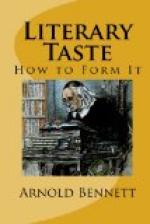Then, subordinate to the main purpose, part of the machinery of the main purpose, is the picture of the children—real children until the moment when they fade away. The traits of childhood are accurately and humorously put in again and again: “Here John smiled, as much as to say, ‘That would be foolish indeed.’” “Here little Alice spread her hands.” “Here Alice’s little right foot played an involuntary movement, till, upon my looking grave, it desisted.” “Here John expanded all his eyebrows, and tried to look courageous.” “Here John slily deposited back upon the plate a bunch of grapes.” “Here the children fell a-crying ... and prayed me to tell them some stories about their pretty dead mother.” And the exquisite: “Here Alice put out one of her dear mother’s looks, too tender to be upbraiding.” Incidentally, while preparing his ultimate solemn effect, Lamb has inspired you with a new, intensified vision of the wistful beauty of children—their imitativeness, their facile and generous emotions, their anxiety to be correct, their ingenuous haste to escape from grief into joy. You can see these children almost as clearly and as tenderly as Lamb saw them. For days afterwards you will not be able to look upon a child without recalling Lamb’s portrayal of the grace of childhood. He will have shared with you his perception of beauty. If you possess children, he will have renewed for you the charm which custom does very decidedly stale. It is further to be noticed that the measure of his success in picturing the children is the measure of his success in his main effect. The more real they seem, the more touching is the revelation of the fact that they do not exist, and never have existed. And if you were moved by the reference to their “pretty dead mother,” you will be still more moved when you learn that the girl who would have been their mother is not dead and is not Lamb’s.
As, having read the essay, you reflect upon it, you will see how its emotional power over you has sprung from the sincere and unexaggerated expression of actual emotions exactly remembered by someone who had an eye always open for beauty, who was, indeed, obsessed by beauty. The beauty of old houses and gardens and aged virtuous characters, the beauty of children, the beauty of companionships, the softening beauty of dreams in an arm-chair—all these are brought together and mingled with the grief and regret which were the origin of the mood. Why is Dream Children a classic? It is a classic because it transmits to you, as to generations before you, distinguished emotion, because it makes you respond to the throb of life more intensely, more justly, and more nobly. And it is capable of doing this because Charles Lamb had a very distinguished, a very sensitive, and a very honest mind. His emotions were noble. He felt so keenly that he was obliged to find relief in imparting his emotions. And his mental processes were so sincere that he could




